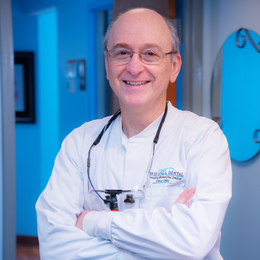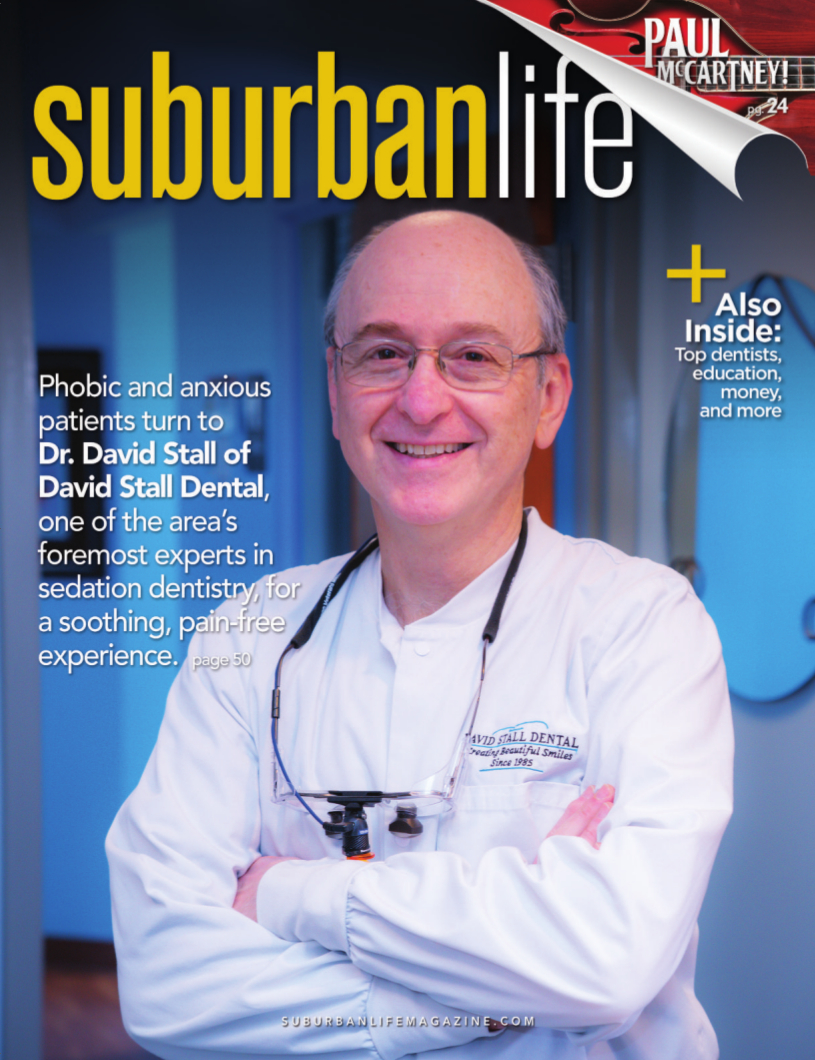
Nothing to Fear
Phobic and anxious patients turn to Dr. David Stall of David Stall Dental, one of the area’s foremost experts in sedation dentistry, for a soothing, pain-free experience.
What terrifies you? Some might suggest watching a horror movie on a dark night as wind-swept rain pelts the windows. Others might describe walking past a cemetery alone at midnight, or maybe feeling a snake slither across their bare flesh. While each of these scenarios is enough to chill the blood, an astoundingly high number of Americans can think of something even more frightening: taking a seat in a dentist’s chair.
As many as 40 million Americans fear going to the dentist, according to the Colgate Oral and Dental Health Resource Center. The mere thought of reclining in an examination chair as a dentist probes their teeth and gums with sharp metal tools is enough to make some people postpone or cancel an upcoming appointment, or go without care altogether. As a result, any existing dental woes only get worse.
Such fears can be allayed by choosing the right dentist, a practitioner with decades of experience, a practiced hand, and an unparalleled reputation for giving patients a painless experience. Enter David Stall, D.M.D., a graduate of the University of Pennsylvania School of Dental Medicine who is board certified and trained in intravenous and oral sedation.
For two decades, Dr. Stall and his staff at David Stall Dental in West Chester have offered sedation dentistry to keep such patients calm and comfortable. Whether a patient requires a dental implant, a full-mouth reconstruction, or something as routine as a filling or a dental cleaning, Dr. Stall’s use of sedation—nitrous oxide, commonly referred to as laughing gas, or oral or intravenous sedation—relaxes the patient to the point of drowsiness, removing all anxiety in the process.
“In my practice, I cater to people who have some level of anxiety and fear,” says Dr. Stall. “I have a lot of other dentists referring patients to me that can’t get the patient comfortable. There are some people who I can’t even look in their mouth if they’re not sedated. Other people are good up to a point, but if I go beyond that point, they’re not. They’re all a little different. Sedation helps calm them.”
How sedation dentistry works: On the day of an appointment with Dr. Stall, a patient will be driven to the office by a family member or friend. During the appointment, a monitoring device will be placed on the patient’s finger and arm to monitor vital signs. After the appointment, the patient will be driven back home to recover. Most patients are able to return to work the next day.
An ancillary benefit to the sedation dentistry Dr. Stall uses to relax patients is its amnesic effect. Patients will have no memory of their visit and feel as though a two-hour appointment lasted only a few minutes. As one of Dr. Stall’s many satisfied patients explained in a video on the practice’s website, “You don’t feel anything. It’s like you’re not there. It’s a beautiful thing.”
Nitrous oxide, which relaxes a patient to the point of not caring about their surroundings, is one of the more commonly requested types of anesthesia from patients who have dental anxiety. Dr. Stall suggests patients often request it by name. Administered by a hood over the nose, the gas is delivered before and during the procedure, giving the patient a feeling of serenity.
While both oral and IV sedation are effective, Dr. Stall notes a significant difference between the two.
“If I run an IV, I can put the exact amounts of drugs in to get the patient sedated,” he says. “But with pills, or oral sedation, I won’t know if one or two pills is enough. That’s why I don’t use oral sedation as much; I don’t feel I have as much control over what the patient needs. With IV or oral sedation, people get amnesia about the procedure. Patients will always get nitrous oxide—I always start with that—but after we do the IV, they may also be talking to me during the procedure, yet their eyes are closed.”
Whichever sedation protocol Dr. Stall decides is best, the end result is a relaxing and pain-free procedure. After all, Dr. Stall is considered one of the foremost authorities on sedation dentistry. He became certified in this procedure in an effort to provide better treatment to phobic patients and those with nausea or strong gag reflexes.
“One of the reasons people call me is because they have that phobia and know I do sedation,” he says. “People look for a dentist that can help calm their fears.”
As an increasing number of his patients suggest, no one does it better.
About Dr. Stall
Having received his master’s degree in public health at Tulane University, Dr. Stall moved to Philadelphia in 1979 to attend the University of Pennsylvania School of Dental Medicine. Following graduation in 1983, he spent the next year as a resident at the Mount Sinai Medical Center in New York, where he received additional training in general and hospital dentistry. In 1985, he opened his dental practice in West Chester.
Dr. Stall has earned many accolades for his exceptional skills. In 1989, for example, he received the prestigious Academy of General Dentistry Fellowship Award, given to those dentists who have shown dedication to patient care through continuing education. He has also taken more than 2,000 hours of continuing dental education courses since 1983, and is a past clinical instructor in restorative and cosmetic dentistry at the University of Pennsylvania. In addition, he mentors other dentists in areas relating to implant and restorative dentistry.
In 2004, Dr. Stall began the required 80-hour hospital-based course Pennsylvania requires for sedation-dentistry certification. He also received his Advanced Cardiac Life Support certificate, another requisite for performing this work. After receiving his temporary sedation accreditation, his office was officially certified by a series of oral surgeons who watched him perform. Once they completed their report saying that he was accomplished in the processes, the temporary certificate became permanent. The entire process also must be renewed every six years, and continuing education is required for the yearly maintenance of the certificate.
Dr. Stall was named to Pennsylvania’s state anesthesia board in November. He also volunteers to visit other sedation dentists’ offices to evaluate and recertify them.
David Stall Dental
1646 West Chester Pike, Suite 1
West Chester, PA 19382
(610) 692-8454
Photography by Jody Robinson
Published (and copyrighted) in Suburban Life magazine, January 2021.



